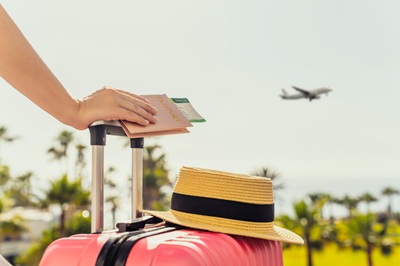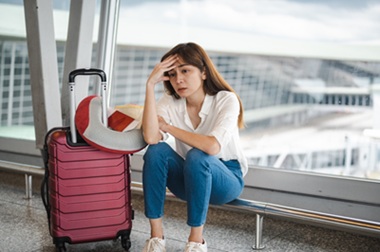Travel Insurance Germany
Learn what travel insurance for Germany can cover, from medical emergencies to trip delays, and explore your options before your European journey begins.
Travel Insurance for Germany
Germany is a country where historic landmarks, scenic countryside, and modern cities come together to create an unforgettable travel experience. Whether you're planning to explore Berlin’s cultural sites, take in the views of Neuschwanstein Castle, or enjoy the charm of small towns, preparing for your journey includes more than booking flights and accommodations. Considering travel insurance for Germany can help enhance your trip by offering support in case of unexpected events, like needing medical treatment abroad or facing a trip interruption. With the right travel insurance, travelers can focus on enjoying the adventure while staying covered throughout their time in Europe.
- What Should Your Travel Insurance Cover for a Trip to Germany?
- How Does Travel Insurance for Germany Work?
- Do I Need Travel Insurance for Germany?
- How Much Does a Travel Protection plan Cost for Visiting Germany?
- Our Suggested AXA Travel Protection Plans
- What Types of Medical Coverage Do AXA Travel Protection Plans Offer?
- Are There Any COVID-19 Restrictions for Travelers Visiting Germany?
- Traveling With Pre-existing Medical Conditions
What Should Your Travel Insurance Cover for a Trip to Germany?
Your travel insurance to Germany should cover trip cancellation, trip interruption, and emergency medical expenses. When it comes to international travel, the US Department of State outlines key components that should be included in your travel insurance coverage.
AXA Travel Protection plans are designed with these coverages in mind.
-
Medical Coverage – The priority is making sure your health is in order. With travel medical insurance, you can have access to medical coverage and quality healthcare during your trip overseas in the event of unexpected medical emergencies.
-
Trip Cancellation & Interruptions – Unexpected trip cancellations can dampen the mood. AXA Travel Protection offers coverage against unforeseen events.
-
Emergency Evacuations and Repatriation – In situations where transportation is dire, AXA Travel Insurance policy offers provisions for emergency evacuation and repatriation.
-
Coverage for Personal Belongings – AXA Travel Insurance offers coverage for your personal belongings with assistance against lost or delayed baggage.
-
Optional Cancel for Any Reason – For added flexibility, AXA Travel Insurance offers optional Cancel for Any Reason coverage, allowing you to cancel your trip for non-traditional reasons. This feature is exclusive to AXA Platinum Plan holders.
In a few seconds, you can get a free quote and get a suitable travel insurance policy for visiting Germany.
How Does Travel Insurance for Germany Work?
Imagine this: You're exploring the scenic beauty of the Rhine River when, unfortunately, you fall ill unexpectedly. In need of medical attention, you're relieved to have AXA Travel Insurance with the "Emergency Medical Expenses" coverage. The policy offers care for your medical costs, including hospital stays and doctors' fees, so you receive the necessary care.
In challenging circumstances, AXA Travel Insurance stands ready to assist you in developing a strategic course of action. Here’s how travelers can benefit from an AXA Travel Protection Plan:
Baggage Benefits
-
Luggage Delay: If the airline delays your checked baggage, your policy might offer reimbursement for essential items like clothing and toiletries due to the luggage delay provision.
-
Lost or Stolen Luggage: In the unfortunate event of permanent loss or stolen luggage, your policy may offer reimbursement for its value, assisting you in replacing your belongings.
Medical Benefits
-
Emergency Medical Expenses: Should you fall ill or have an accident during your trip, your policy may offer coverage for emergency medical expenses, including hospital stays and doctor's fees.
-
Emergency Evacuation & Repatriation: In case of a serious medical emergency, your policy may include provisions for emergency evacuation & repatriation to the nearest appropriate medical facility or repatriation.
-
Non-Emergency Evacuation & Repatriation: In non-medical crises (e.g., political unrest), your policy may cover non-emergency evacuation or repatriation, subject to policy terms.
Pre-Departure Travel Benefits
-
Trip Cancellation: You may be eligible for reimbursement if you opt for a trip cancellation due to a covered reason, such as sudden illness or injury.
-
COVID-19 Travel Insurance: Coverage is available for trip cancellation and medical expenses related to COVID-19 travel insurance, subject to policy terms and conditions.
-
Trip Delay: If your flight faces trip delays due to unforeseen circumstances, you may have coverage for additional expenses such as meals and accommodations.
Post-Departure Travel Benefits
-
Trip Interruption: In case you need to cut short your trip, you could be eligible for reimbursement under trip interruption coverage for the unused portion of your trip.
-
Missed Connection: If you miss a connecting flight due to delays or cancellations, missed connection coverage may help with expenses like rebooking fees and accommodations.
Additional Travel Benefits
-
Lost Skier Days: Exclusive to Platinum policyholders, the lost ski days benefit offers reimbursement to mitigate some costs associated with pre-paid ski tickets that you or your traveling companion cannot use due to specified slope closures.
-
Lost Golf Days: Exclusive to AXA Platinum Plan policyholders, the lost golf days optional benefit offers reimbursement to mitigate the expenses linked to prepaid golf arrangements that you or your travel companion are unable to utilize due to specified golf closures.
Optional Travel Benefits
-
Rental Car (Collision Damage Waiver): Exclusive to Gold & Platinum policyholders, this optional benefit gives travelers a rental car collision damage waiver against damage and theft.
-
Cancel for Any Reason: Exclusive to Platinum policyholders; this optional benefit gives travelers more flexibility to cancel their trip for any reason outside of their standard policy.
Do I Need Travel Insurance for Germany?
Citizens from non-EU/non-EFTA states like the U.S., Canada, and New Zealand can enter Germany without a visa, and are not obligated to have travel insurance.
Even if you're not required to secure travel insurance, it is still highly advised.
Why? There are several reasons:
- Medical Emergencies: Given the diversity of activities in Germany, from exploring historic sites to enjoying outdoor adventures, having coverage for unexpected medical expenses allows you to travel with assistance. This benefit becomes especially crucial in case of illness or accidents, allowing you to access necessary medical care without hurting your pocket.
- Lost Baggage: Airlines sometimes mishandle baggage, and the last thing you want is to be without your essentials in an unfamiliar place. Travel insurance offers to cover the cost of replacing necessary items, allowing you to continue on.
- Lost or Stolen Luggage: While generally safe, tourist destinations in Germany may pose a risk of theft. The "Lost or Stolen Luggage" benefit is important in the unfortunate event of permanent loss or theft of your belongings. It offers reimbursement for the value of your lost items and essential possessions.
Travel insurance for Germany can help travelers prepare for unexpected issues during their trip. For those applying for a Schengen visa, travel health insurance is often required and may include medical evacuation, accident insurance, and liability coverage. If your visit includes Switzerland or other Schengen countries, your plan should cover the entire duration of travel.
How Much Does a Travel Protection Plan Cost in Germany?
In general, travel protection plans cost about 3 – 10% of your total prepaid and non-refundable trip expenses. The cost of travel protection plans depends on two factors:
-
Total Trip cost: The total non-refundable cost you have already paid for your upcoming trip. This includes prepaid excursions, plane tickets, cruise costs, etc.
-
Age: Like any other insurance type, the correlation is rooted in increased health risks associated with older individuals. It's important to note that this doesn't make travel insurance unattainable for older individuals.
With AXA Travel Insurance, travelers to Germany will be offered four tiers of insurance: Bronze, Silver, Gold, and Platinum. Each provides varying levels of coverage to cater to individuals' s preferences and travel needs.
Our Suggested AXA Travel Protection Plans
AXA Travel Insurance presents travelers with four travel plans – the Bronze, Silver, Gold, and Platinum, each offering different levels of coverage to suit individual needs. Given that German hospitals often do not accept U.S. health insurance or Medicare, we genuinely advise travelers to consider purchasing any of these plans, particularly for the crucial coverage they offer for emergency accident and sickness medical expenses.
The Platinum Plan is your go-to choice if you're looking for extra coverage for Germany’s experience. "Cancel for Any Reason" offers greater flexibility for those unexpected twists in your travel plans, and the "Rental Car (Collision Damage Waiver)" offers assistance when you're out exploring Germany's stunning landscapes in a rental car.
Whether you're navigating the slopes of the Bavarian Alps or exploring the ski trails in the Black Forest, AXA Travel Insurance’s "Losts Ski Days" benefit may offer reimbursement for pre-paid ski tickets in the event of specified slope closures, so you can make the most of your skiing experience in Germany's world-class ski resorts.
What Types of Medical Coverage Do AXA Travel Protection Plans Offer?
AXA covers two types of medical expenses:
- Emergency medical expenses
- Emergency evacuation & repatriation
Emergency medical expenses: Covers unforeseen events such as fractures, burns, sudden illnesses, and allergic reactions.
Emergency evacuation and repatriation: can cover your immediate transportation home in the event of an accidental injury or illness.
Are There Any COVID-19 Restrictions for Travelers to Germany?
Currently, COVID-19 entry restrictions for traveling to Germany have been removed. You can now enter Germany for any reason, including tourism and visits, without needing to show proof of vaccination, recovery, or a negative test result.
Healthcare in Germany can be costly for travelers without insurance. A travel insurance plan can help cover medical treatment abroad, including unexpected treatment costs and medical bills. Some plans offer flexible deductible options and allow you to manage simple fillings online through the provider’s website. If you receive care, be sure to submit all required documents to support your claim.
Traveling With Pre-existing Medical Conditions
Traveling with pre-existing medical conditions can complicate your plans, but with AXA Travel Protection, we're here to support you during your trip.
Our Gold and Platinum plans offer coverage for pre-existing medical conditions. The Platinum plan, in particular, is our highest-offered choice for travelers who want our highest coverage limits and optional add-ons,
What does this mean for you? If you've got a medical condition that's been hanging around, you can qualify for coverage under our Gold and Platinum plans with a pre-existing medical condition, so long as it’s within 14 days of placing your initial trip deposit and in our 60-day look-back period. We're here to ensure you travel easily, no matter your health situation.
Choosing a plan with optimal coverage ensures you're better protected. It’s your responsibility to confirm the plan meets all requirements and includes support for managing travel documents and costs outside your home country.
FAQs about Travel Insurance for Germany
1. Can you buy a travel protection plan insurance after booking a flight?
You can buy a travel protection plan even after your flight is booked.
2. When should I buy a travel protection plan to visit Germany?
It is advisable to purchase a travel protection plan for your trip as soon as you have made your initial trip deposit (prepaid and non-refundable trip costs). AXA Travel Insurance offers coverage as soon as you purchase your protection plan. We can give coverage against unforeseen events before you leave for your trip. Additionally, our policies offer coverage for preexisting medical conditions and Cancel for Any Reason if you purchase your protection within 14 days of making your initial trip deposit.
3. Do Americans need travel insurance in Germany?
No. Travel insurance is not mandatory for U.S. citizens staying in Germany for less than 90 days. Nonetheless, securing travel insurance is highly advisable. Medical expenses can be significant for non-residents, and having travel insurance is important when you consider the potential costs of prescriptions.
4. What is needed to visit Germany from the USA?
To enter Germany, US passport holders need a valid US passport issued within the last ten years, with at least three months of validity after leaving Germany and two blank pages. Additionally, make sure to have proof of a return ticket.
5. What happens if a tourist gets sick in Germany?
If you become sick in Germany, travelers with AXA Travel Insurance can contact the AXA Assistance hotline at 855-327-1442. Contact information is typically provided within the insurance documentation. Please ensure to read through your policy details and information.

Travel Assistance Wherever, Whenever
Speak with one of our licensed representatives or our 24/7 multilingual insurance advisors to find the coverage you need for your next trip. Contact Here



